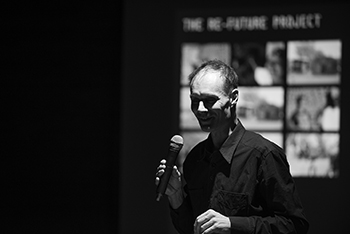Latest News Archive
Please select Category, Year, and then Month to display items
03 October 2018
|
Story UFS
|
Photo Katlego Sekele
 Students engaged authorities and Student Affairs
representatives on sexual and gender-based matters.
Students engaged authorities and Student Affairs
representatives on sexual and gender-based matters.
Do you know enough about the Sexual Harassment, Sexual Misconduct and Sexual Violence policy adopted by the university in June 2018? The Office for Gender and Sexual Equity (GSE) at the University of the Free State (UFS) hosted a dialogue on the role of the institution in matters of sexual and gender-based violence and addressing issues surrounding sexual violations.
Developments such as the countrywide #TotalShutdown: Intersectional Women’s March Against Gender-based Violence last month serve as proof of the dire need for issues surrounding sexual violations to inform policies and active safety measures.
Policy purpose
According to the policy, the objectives are to create a safe and enabling environment, establish a common understanding of what constitutes sexual harassment, sexual misconduct and sexual violence, provide applicable and accurate information, ensure that victims receive the necessary support, clearly outline disciplinary procedures for perpetrators, and clarify institutional accountability.
Student’s take on solutions
Tammy Fray, a member of the Student Representative Council, who formed part of the panel at the discussion, says the policy is not a one-stop-shop solution. “The policy is a guiding document. We have to then use it to inform activist work. We cannot always put the onus on policies and codes of conducts to solve problems. However it is our responsibility within this academic space to come up with solutions that enhance the way the policy works.”
Be informed about the policy
It is important to understand the stipulations of the policy in order to make full use of it. Geraldine Lengau, Officer at the GSE said: “It’s important that students know that the institution is not operating in silos but that their demands have been heard and the institution has acknowledged that there is a need for the policy to be adopted. It also makes the process of reporting better with the assistance of the Sexual Assault Response Team coordinator.”
Arts and Science collaborate in creating sustainable futures
2016-03-16

Creating a future where living green is the status quo: Dr Keith Armstrong
Photo: Lihlumelo Toyana
|
In creating partnerships across disciplines, mankind gains a deeper understanding of how to create the future. This is the premise upon which Dr Keith Armstrong bases his research and experimental art. Dr Armstrong is an Australian Hybrid Media artist and a Senior Research Fellow at Queensland University of Technology in Australia.
Artists that make things happen
“My journey has shifted from an artist that makes things to an artist that makes things happen,” he said at the New Futures: Innovations in Arts and Science public talk recently at Oliewenhuis Art Museum. The talk, organised by the Johannes Stegmann Art Gallery, was part of a series of artistic projects presented by the Programme for Innovation in Arts and Development (PIAD). This initiative is spearheaded by the UFS and Vrystaat Arts Festival, kindly supported by The Andrew W. Mellon Foundation.
Dr Angus Hervey – an Australian writer, technologist and science communicator– was also a speaker at the event. Dr Hervey is a co-founder of Future Crunch, a platform for intelligent, optimistic thinking about the future. He strongly shares Dr Armstrong’s passion and viewpoints.
Dr Armstrong’s work is motivated by social and ecological justice. His non-traditional research and more than 60 artworks serve to evoke audiences to create sustainable futures.
Building the future
Dr Armstrong is in the process of making “things happen” in informal settlements across the Free State by means of his Re-Future project. The project brings together sustainability, community development, and creative action. It moves away from conventional art practices and instead offer a platform to rethink and therefore re-future our practices of sustainability.
The Re-Future project has been initiated through a collaboration between the Johannes Stegmann Art Gallery, the UFS Centre for Development Support (CDS) and Qala Phelang Tala (QPT) and the Vrystaat Art Festival.
According to Anita Venter, a lecturer at CDS and founder of QPT, empowerment is at the centre of the artist-initiated, yet community-controlled project. “It gives a new direction and new hope to the community,” she said.
For more information
Angela de Jesus, dejesusav@ufs.ac.za or +27(0)51 401 2706